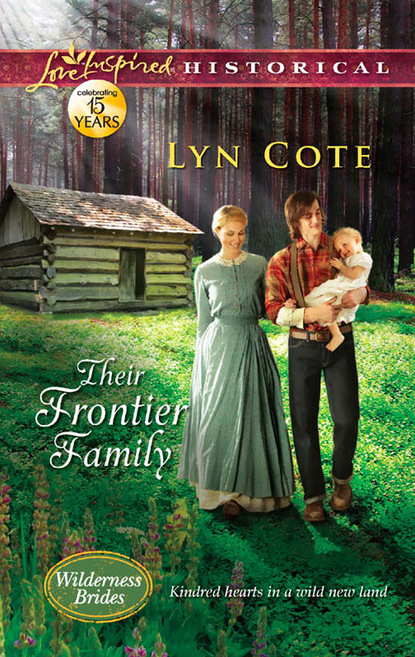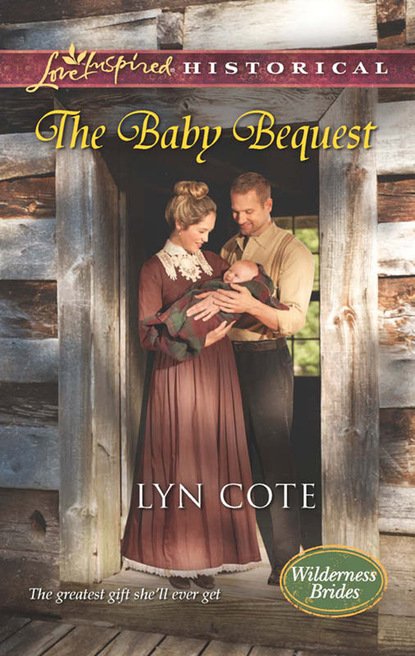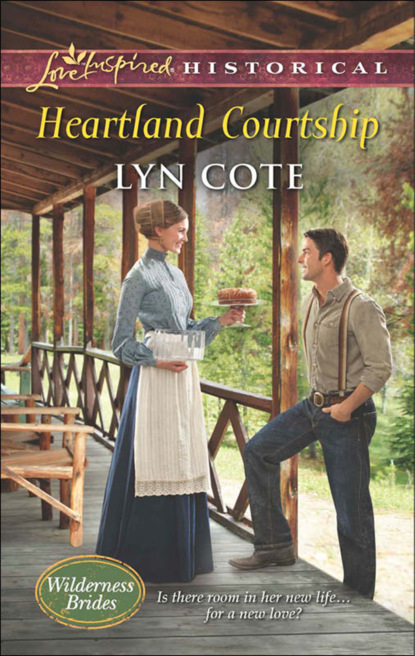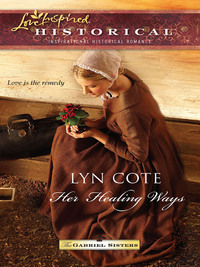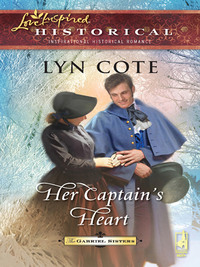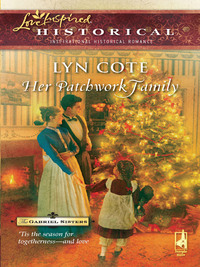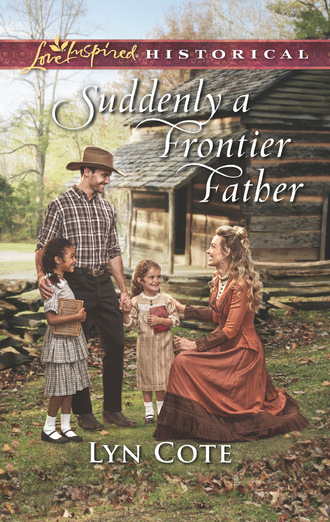
Полная версия
Suddenly A Frontier Father
Asa, Judith, Emma and Mason all turned to look at the boy.
“I can help.” Colton stood up. “I can fetch and carry. Mr. Brant, you helped me and Lily when we needed help. So I can help Mr. Chandler.”
Asa gripped the boy’s shoulder and smiled at him with approval.
“That makes good sense,” Emma agreed. “Mr. Chandler walked here. He has a crutch. He just needs a little help. I completely understand why he wants to be in his own place, don’t we all?”
“Thank you,” Mason said with emphasis. “Asa, please let Colton go with me and the girls. Thanks to Miss Jones and the children, everything is ready for us to settle down for the night. And that’s all I want.” He was grateful to Emma for backing him up and to the boy for offering. But he was afraid to look at her and betray more than this. Why did she have to be both lovely and kind? She could do much better than him for a husband.
Asa and Judith exchanged glances. “Very well,” Asa agreed. “Colton, gather your things and your bedroll from up in the loft. Thank you for offering to help our neighbor.”
Colton didn’t reply but obeyed.
Pressing his hands on the table, Mason pushed himself up. Then he manipulated his crutch and secured it under his right arm. He thought he had just enough energy to get home.
Emma stood also and walked to the door. “I’ll bid you all good night. And Judith, thank you for the lovely supper.”
Mason watched the woman he had hoped to marry walk away into the gathering twilight. He bound up his mind against thinking of her. She had been helpful. She has been kind. But she had made it clear with her every glance and every word that she wanted to be only his neighbor and nothing more.
* * *
Emma arrived home and soon, in her nightwear, sat in her rocker, sipping a cup of chamomile tea and honey. She still felt stirred up and hoped the tea would soothe her so she could sleep. The day played through her mind. Her shock at meeting Mason Chandler on Main Street, seeing his two little girls—the silent and troubled Charlotte, the bright and sweet Birdie—and hearing the unguarded words he’d said when he woke.
She took another sip of the warm, sweet tea. If only she were young and unmarked by war, she might have reacted differently. But for four bloody years, she had prayed and hoped and kept up her spirits. Trusting that Jonathan, good-natured and honorable, would return whole and they would spend their lives together. Instead he’d been buried in Virginia. She stopped her thoughts there.
She did not think of Jonathan often anymore. Mason Chandler returning and the words he’d said to her had brought it all back, all the pain, all the waiting. She would keep her distance from him. But then she remembered Mrs. Ashford’s remark about judgment and little Lily’s unusual reticence. Both of Mason’s girls would cause notice in town. They were orphans, Birdie’s mother had no doubt been a slave and Charlotte was deaf. Charlotte and Birdie—how could she help them?
* * *
Monday afternoon, as the students were finishing the last lesson of the day, Emma tried not to show the roiling pot of emotion in the pit of her stomach. Mason and his girls hadn’t attended church yesterday and she could understand that. He’d just sprained his ankle and he didn’t have his wagon yet. But she’d hoped that Colton would walk the girls to school today so she could help them get acquainted.
The rumors about Mason’s “peculiar” girls had already begun in town. Emma wanted to set the right tone and ease the girls into acceptance. She gazed over the heads of her students and let it rest on Colton’s dark head bent over his slate. She didn’t want the other children to hear, but she needed to talk to Colton.
“Children, finish the questions and then put away everything. Our day together is ending.”
The children obeyed with some murmuring. As usual, the children lined up in the center aisle and waited for her to position herself at the door. As usual, she spoke to each child, encouraging them and reminding them of what they should be practicing at home that evening. It always included studying their spelling list. The town was insistent that their spellers shine in the spring spelling bee. Her students prepared all year.
When Colton stopped in front, she asked him if he would stay to help with something. He nodded and then moved out of line. “Lily,” he called, “I got to help Miss Jones. Wait on the swing.”
Soon the school was empty except for her and Colton. “What do you want me to do?” Colton looked up at her.
She didn’t try to hide her true concerns. “Why didn’t Birdie and Charlotte come to school today?”
Colton frowned. “The little black girl wanted to come real bad. But Mr. Chandler said no, not yet.”
Emma was afraid of that.
“What do you want me to do here?” Colton asked, glancing out the open window, obviously wanting to leave.
“You’re still helping Mr. Chandler?”
“Yes, they’ll come to our place for supper. Mrs. Brant insisted. And then I’ll walk home with them and stay there for the night.”
“How is Mr. Chandler’s ankle?” She refused to let his dazed, whispered words repeat once more in her mind. Or she tried to.
“He doesn’t say anything about it. But I see he still needs a crutch.” Colton shifted on his feet, reminding her that he wanted to be off and out of school.
“Thank you, Colton.”
The boy paused and turned back at the doorway. “When Lily and me started school here, some kids acted strange around us. I think it’s ’cause...’cause our parents died. People don’t like it when you’re different.”
The boy’s wisdom surprised and impressed her. “I’m afraid that is correct.”
“I like Birdie. She’s real sweet and always helps.”
“That’s very true. Thank you, Colton.”
The boy left and she walked around the schoolroom, making certain everything was in place. She could understand why Mason wanted to protect his two little girls, but keeping them at home hidden did them no good. They were going to spend their lives here—and they both deserved as good a life as anyone else here in Pepin. If it weren’t for the girls and their need for special care, she could ignore this man. But she could see the girls might need her.
Mason Chandler, you are wrong if you keep them home. She knew how stubborn men could be. But it might just be that he needed time. She would give him time, but just so much.
* * *
A few days later, in the evening at the Brants’, the fragrance of the rabbit stew set before Mason literally caused him to salivate. He bowed his head politely while Asa offered the prayer over the meal. Hearing another man pray heightened the feeling of stone encasing his own heart. Maybe God hadn’t deserted him but it sure felt like it. Then he scolded himself. Years ago he’d lost his mother, and months ago his father, but he’d gained a sister and Birdie. He resisted a thought about also losing Emma.
“I caught the rabbits,” Colton spoke up. “I used my snares.”
For the hundredth time or more Mason found himself glancing at the door. He tried not to but he always looked for Emma to join them. He turned his mind from this. “Well done, Colton,” Mason replied, recalling his boyhood days. Then another worry intruded. How could he bring up the unpleasant conversation about Asa’s destroyed corn and hay crops? He’d tried twice now but Asa had changed the subject both times.
Birdie and Charlotte sat on the bench beside him. He could tell Birdie wanted to talk to Lily, but the little girl rarely looked at them. Pain twisted in his chest over this. Birdie had wanted to go to school with Colton each day but he had kept the girls home. Why did people judge others on things like skin color and deafness?
“I’m glad you agreed to eat supper with us till your ankle is healed,” Asa’s wife, sitting on the opposite side of the table, said. “How is it doing? Did the goose grease help?”
At her words, Mason’s ankle throbbed as if taunting him with his weakness. “Yes, it helped. My ankle’s still swollen some, but it’s improving.”
“It will be all better soon.” Judith forked up a bite of stew.
“I thank you for your hospitality and for Colton’s help,” he said, grateful, knowing that his girls needed more food than he would be able to rustle up while standing on a crutch by the fire. He decided this was the opening he’d been waiting for. “And Asa, you’ve not let me discuss your planting my crops—”
“I didn’t plant your full crops—”
“You did more than I would ever have expected. And I’m going to share my corn and hay with you. I think—”
Asa tried to interrupt.
Mason forged onward. “I think that if we are careful, we’ll have almost enough to make it through the winter and put away some seed for next spring. It will be tight, but we can make it.”
“I didn’t put it in for that reason.” Asa still sounded put out.
“I know, but it’s a blessing—for both of us—that you did.”
“Asa,” Judith said, resting a hand on her husband’s sleeve, “Mason is speaking the truth. What you have done for a friend has come back to bless all of us.”
The woman’s mention of blessing hit Mason squarely in the heart, the heart that had suffered and been stretched this year. “And when November comes,” he spoke up, banishing these thoughts, “you’ll have to permit me to bring you some fresh meat, Mrs. Brant.” He savored the rich gravy, rolling it on his tongue.
“I’m also looking forward to fall hunting,” Asa commented. “But now’s a good time to start geese, grouse and duck.”
Asa and Mason discussed hunting for a while. Birdie was busy signing to Charlotte. Mason often wondered what went on in his little sister’s head. He must work harder at learning to talk to her with his hands. “Thank you again, Mrs. Brant,” he murmured.
She merely smiled at him. Again, Mason was very aware of the change just a few months of marriage had wrought in his friend. Almost three years ago, when Mason had first arrived in Pepin and found Asa as his neighbor, he’d liked Asa right away. But since they’d last met, Asa had changed, and for the better. Asa now smiled and talked easily, appeared to be more at peace. Mason couldn’t stop himself from once again wishing he’d been here in March to meet his mail-order bride. Well, life was what it was.
* * *
On Friday afternoon, Mason was in his barn, unhitching the team he’d just reclaimed and fetched from Levi’s place outside town to the northeast. He’d left his girls with Asa’s wife and rode one of Asa’s horses to Levi’s. His ankle still pained him. He limped but he’d left off the crutch today.
He turned, startled when he heard his name being called. “Miss Jones.” Nearly a week had passed since he’d seen her. He drank in the sight of her like a thirsty man finding water in the desert. He stiffened himself. Don’t embarrass yourself. “What can I do for you?”
“I’m glad to see you are walking without your crutch,” she said, not replying to his question.
Birdie with Charlotte hurried away from the head of one of the horses toward her. “Miss Emma!” Birdie greeted her.
“Hello.” Emma bent to talk to them. “Girls, I would like to have a few words in private with Mr. Chandler. Could you go play? I’ll talk to you before I leave.”
Birdie looked thoughtful but drew Charlotte outside, signing to her.
Mason didn’t have to think about why this lady had come. Colton had repeatedly told him that Miss Jones wanted the girls in school. He gritted his teeth. Evidently Emma was a woman to be reckoned with. His irritation over this vied with his unwelcome pleasure at seeing her here, so fine and determined. “I can guess why you’ve come. But I wasn’t ready to send them to school yet.” He focused on working free the horses’ harness buckles.
“Your girls are ready. Do you think you are helping them, keeping them out?”
“I’m keeping them from being hurt. Children can be cruel,” he said, just short of snapping at her.
“And adults can be. Do you think keeping them out protects them from hurt? Don’t you realize that keeping them home is hurting them, too?”
“I can teach them their letters and numbers.”
“That’s not what I mean.” She moved closer and paused, resting a hand on the rump of the nearest chestnut horse. “Isolating them is telling them that you don’t think they can handle school. That they are lesser than the other children.”
Her words cut through him like a serrated knife, a dull one that rasped painfully. He stepped back, releasing the last buckle, and led one horse toward a stall. Her accusation bounced around in his head.
From the corner of his eye, he glimpsed her standing backlit by the sunshine. She brought to mind a picture he’d seen as a child in a book. It had been the image of an avenging angel protecting the innocent. Miss Emma Jones did not take matters having to do with children lightly.
“Are you ashamed of Birdie and Charlotte?” she snapped.
“No,” he snapped back. “They are wonderful little girls.”
“Then bring them to school Monday.” She turned as if to leave. “Have some trust in me, trust in the children of this town.”
She left him without a word to say.
He moved to the open barn door but remained out of sight. He wanted to hear what she said to the girls.
“Birdie! Charlotte!” she called in a friendly voice.
The girls ran to her, Birdie beaming and Charlotte cautious, holding Birdie’s hand. “Can you play with us?”
“Just a bit. How about ‘Ring around the Rosy’?” Emma joined hands with the girls and they moved in a circle, singing and, at the right moment, all falling or, rather, stooping down.
“I must go now. I’m sure I’ll see you Sunday at church.” And without a glance toward the barn, she called out, “See you Monday at school. Nine o’clock! Don’t be late!”
He watched her go, unable to look away until she disappeared around the thickly forested bend.
The girls ran to him. “Did the lady teacher say we could come to school?” Birdie asked.
He looked down into Birdie’s eager face. So many thoughts and emotions swirled in his mind and heart. “Do you want to go to school?”
“Yes!” Birdie signed to Charlotte. “She says yes too. We can see Lily and Colton. And meet other children.”
He wondered if Birdie was capable of grasping the concept of prejudice.
“Some children will like us and some won’t,” Birdie said, answering his unspoken question. “But we want to go to school.”
He drew in a deep breath. So be it. He turned to go unharness the other horse. He hoped Miss Emma Jones knew what she was doing. He wanted everything good for his children. But he knew how cruel people could be. This moved him to snap at God, You’d better keep them safe.
He then remembered more of Emma’s words and realized that he would have to face the whole town the day after next at church. His hurt ankle had given him an excuse to bypass last week’s service. But that excuse had lapsed. Miss Emma Jones was right. He must publicly face the community with his girls, starting Sunday.
He was feeling the same dread and anticipation, a heavy weight in his middle, that he’d faced many times in the war. The mornings just before a battle, everyone—except for those who thought they needed to lighten the somber mood—had been silent, barely speaking, girding themselves for the imminent crucible of cannon, gunfire, black smoke and perhaps death.
He tried to shake off the feeling. No one would be firing at him on Sunday. But he worried for Birdie and Charlotte and any negative reactions to them. He didn’t want them to be hurt. His only hope was from the friends who’d stood by him. One was Noah Whitmore, the preacher, who’d written the orphan home’s director that he was fit to adopt his girls. Would people remember where they were—in God’s house? At least no one knew the dark secret he must—above all else—keep hidden.
Chapter Three
Mason thought he’d prepared himself for meeting Emma on Sunday morning, but he hadn’t expected them to enter the combined schoolroom-church at almost the same moment from opposite ends of the room, he from the school entrance and she from the teacher’s quarters. He halted in midstep.
And so did she. She wore a flattering rose-pink dress with ivory lace at the neck. Her beauty took his breath. But instantly he shook himself inwardly and moved forward. In the past days her kindness to Birdie and Charlotte had drawn his gratitude, making him more vulnerable to her. He steeled himself against regret. I have to get over missing my chance with her.
He’d been gone for half the year, but he hoped no one had taken his pew. He forced himself to nod to a few people he knew even though they were gawking. Then he focused on getting the girls settled beside him. Thanks to Asa’s wife, the girls’ dresses were clean and pressed as well as his own white Sunday shirt.
He tried not to track Emma from the corner of his eye, but he glimpsed her full skirts swish past them as she joined her sister and family in the pew to his right, forward a row. Bitter thoughts of his father and how once again he had ruined something for Mason rushed into his mind. He bowed his head, willing the thoughts away. What was done was done and could not be changed. He still had his land, his crops and now, his girls.
Hoping that no one would hurt them with unthinking or unkind remarks, he gathered them close to him and kissed their foreheads. “Now, you girls be good,” he murmured.
“We always be good in church,” Birdie murmured and signed to Charlotte, who looked up at him and smiled timidly.
His poor little sister. She so rarely looked happy. Had what Mrs. Hawkins, the lady who ran the orphans’ home in Illinois, said been true? Was hysterical deafness even real? Was there a chance Charlotte might hear again someday? He shook his head. He didn’t have that kind of faith.
Tall and middle-aged, Mrs. Lavina Caruthers moved to the front as Noah Whitmore raised his arms. “Let us pray.” After Noah’s prayer, Lavina led them in singing the opening hymn.
Then Gordy Osbourne, a young deacon, rose and began reading the scripture passage, Numbers 12.
“‘And Miriam and Aaron spake against Moses because of the Ethiopian woman whom he had married: for he had married an Ethiopian woman. And they said, Hath the Lord indeed spoken only by Moses? hath he not spoken also by us? And the Lord heard it.’”
Mason never had heard this passage that he could recall. The reading and the story continued, ending with God chastising Miriam and Aaron, the sister and brother of Moses. God had turned Miriam’s skin leprous for seven days in punishment of her speaking against Moses because of his choice of a dark-skinned bride. Evidently the word about Mason’s girls had spread to the preacher. Noah’s boldness in choosing this passage hit Mason as if a rod had been rammed up his spine. Noah’s courage in confronting prejudice humbled him.
“Here endeth the scripture for today,” Gordy finished and sat down, his face flushed.
Lavina rose again and began the second hymn. The congregation rose to sing, but many cast glances over their shoulders at him, and others stood stiffly facing forward.
Mason hoped that Noah’s boldness would not alienate his congregation and cause division here.
At the end of the hymn, Lavina remained standing. “Our preacher has said that I may make an announcement of a sewing and knitting day this coming Saturday morning here. My son Isaiah, who is engaged in mission work north of here with the Chippewa tribe, will be visiting us before winter, and we’d like to have a large donation of quilts, mittens, socks and scarves to send back with him. There is great need among the tribe.” Lavina smiled. “Thank you.”
Noah approached the lectern and bowed his head in silent prayer. Then he went on to preach about the passage Gordy had read, but without calling attention to the situation of the little black girl sitting beside Mason. Noah preached about God calling Moses a humble man and how prejudice had caused his siblings to react with pride and spite and God’s judgment on the proud and unkind. Mason approved. Noah had laid down the precept of God’s opinion of prejudice and spite. Mason didn’t pray often, but he did now, asking God for kindness to be shown here to his little ones.
Everyone rose and sang the closing hymn, “Jesus, Lover of My Soul.” Then Gordy prayed and asked God to bless their week and the coming harvest.
Mason raised his head, feeling refreshed, yet still cautious. Now would come the questions and perhaps the rejection by many of those who had once welcomed him. Against his will his gaze sought Emma to his right. He remembered her kindness to his girls. Again she affected him. He stiffened his resolve to resist the pull to her and led the girls to the aisle.
Indeed, some people brushed past him, but not all. Levi, the blacksmith, and his wife, Posey, stopped. She shook Mason’s hand and then glanced downward. “And how are you, pretty little things?”
“We’re fine, ma’am,” Birdie chirped. “Thank you for askin’.”
At that moment, Emma walked by him.
“Good morning, Mr. Chandler,” she said in passing. “Good morning, Birdie and Charlotte.”
Mason returned the greeting, gripping his tight mask in place. He wished he didn’t react to her, wasn’t so aware of her.
Then she moved on, greeting others.
Mason turned to Levi’s wife again. His heart thumped dully. If Emma had been his wife, he wouldn’t feel so alone, so inept caring for his children. What might have been...
* * *
Ignoring the pull that wanted her to stay and talk to Mason, Emma moved out into the sunshine. As usual, people milled around in clusters in the school yard after Sunday worship, the social event of each week.
Conscious of her role as teacher, Emma moved from group to group, speaking to the parents of each of her students. Out of the corner of her eye, she glimpsed Mason step out of the schoolhouse. She forced herself not to turn to watch him. But she noted that many others watched, almost gawking at him and his girls. Would someone say or do something rude, hurtful? Her lungs tightened as if she herself were bracing for a blow.
As she moved through the people, she sensed an unusual mood. People nodded to her but they said few words and looked somehow stiff. She experienced an unusual tension herself. She could not stop herself from straining to hear the few words Mr. Chandler spoke to others and his girls.
Still no one spoke of the source of the general tension—Birdie and Charlotte—until Emma approached the Stanley family. Mrs. Stanley, who unfortunately had been born with a wart on the side of her large nose, said loud enough to be overheard, “Seems like you had a near miss.” The woman shook her head, and Emma couldn’t stop herself from watching the wart wobble. “If you’d married Chandler this spring, you’d be stuck with his baggage.”
Emma pressed her lips together to keep from replying sharply. She was aware that Mason was keeping to the edge of the gathering with his children near him. Had he overheard this? Bad enough. Worse yet, the woman had said this with her school-age daughter, Dorcas, standing right beside her. Dorcas would be a classmate of the Chandler girls—if Emma had succeeded in persuading Mason to let them come to school.
Emma chose her words with care. “I admire Mr. Chandler for offering his half sister a home.” Her unruly ears strained again to hear his voice.
“Well, he’ll be saddled with her for the rest of his life. A deaf girl. No one will ever take her off his hands.”
Emma rarely had a violent reaction to anything. But she clenched her free hand down at her side. It itched to slap the woman’s face. “My sister and I came here together so that we wouldn’t be separated. Having family nearby is a comfort.”
The woman scowled at her.
The woman’s father-in-law spoke up, “Speaking of family, when will your father be coming back from Illinois?”
“We hope very soon,” Emma replied, grateful for his intervention. Her father, who unexpectedly had followed her and Judith to Pepin within a few months of their arrival, had traveled down to Illinois to visit their brother.


